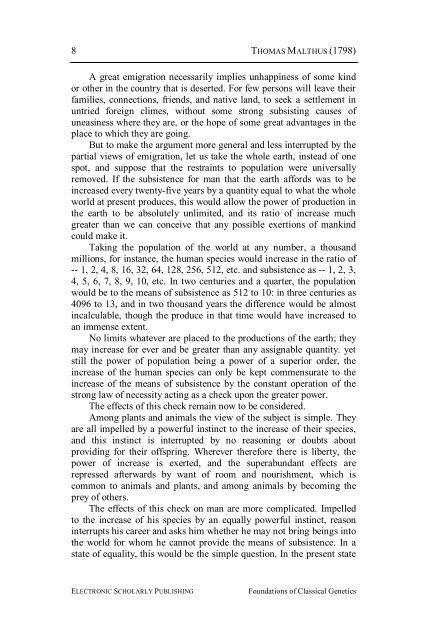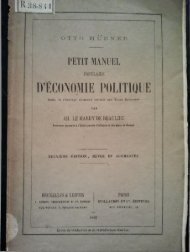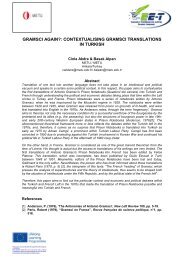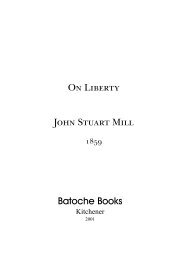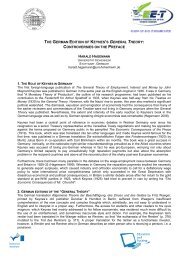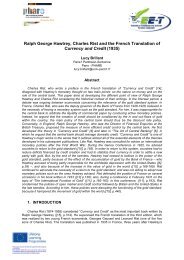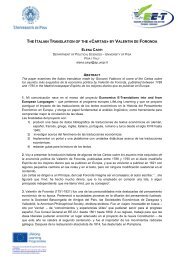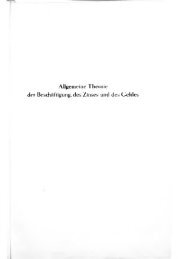Malthus, Thomas, Robert, An Essay on the Principle of Population ...
Malthus, Thomas, Robert, An Essay on the Principle of Population ...
Malthus, Thomas, Robert, An Essay on the Principle of Population ...
Create successful ePaper yourself
Turn your PDF publications into a flip-book with our unique Google optimized e-Paper software.
8 THOMAS MALTHUS (1798)<br />
A great emigrati<strong>on</strong> necessarily implies unhappiness <strong>of</strong> some kind<br />
or o<strong>the</strong>r in <strong>the</strong> country that is deserted. For few pers<strong>on</strong>s will leave <strong>the</strong>ir<br />
families, c<strong>on</strong>necti<strong>on</strong>s, friends, and native land, to seek a settlement in<br />
untried foreign climes, without some str<strong>on</strong>g subsisting causes <strong>of</strong><br />
uneasiness where <strong>the</strong>y are, or <strong>the</strong> hope <strong>of</strong> some great advantages in <strong>the</strong><br />
place to which <strong>the</strong>y are going.<br />
But to make <strong>the</strong> argument more general and less interrupted by <strong>the</strong><br />
partial views <strong>of</strong> emigrati<strong>on</strong>, let us take <strong>the</strong> whole earth, instead <strong>of</strong> <strong>on</strong>e<br />
spot, and suppose that <strong>the</strong> restraints to populati<strong>on</strong> were universally<br />
removed. If <strong>the</strong> subsistence for man that <strong>the</strong> earth affords was to be<br />
increased every twenty-five years by a quantity equal to what <strong>the</strong> whole<br />
world at present produces, this would allow <strong>the</strong> power <strong>of</strong> producti<strong>on</strong> in<br />
<strong>the</strong> earth to be absolutely unlimited, and its ratio <strong>of</strong> increase much<br />
greater than we can c<strong>on</strong>ceive that any possible exerti<strong>on</strong>s <strong>of</strong> mankind<br />
could make it.<br />
Taking <strong>the</strong> populati<strong>on</strong> <strong>of</strong> <strong>the</strong> world at any number, a thousand<br />
milli<strong>on</strong>s, for instance, <strong>the</strong> human species would increase in <strong>the</strong> ratio <strong>of</strong><br />
-- 1, 2, 4, 8, 16, 32, 64, 128, 256, 512, etc. and subsistence as -- 1, 2, 3,<br />
4, 5, 6, 7, 8, 9, 10, etc. In two centuries and a quarter, <strong>the</strong> populati<strong>on</strong><br />
would be to <strong>the</strong> means <strong>of</strong> subsistence as 512 to 10: in three centuries as<br />
4096 to 13, and in two thousand years <strong>the</strong> difference would be almost<br />
incalculable, though <strong>the</strong> produce in that time would have increased to<br />
an immense extent.<br />
No limits whatever are placed to <strong>the</strong> producti<strong>on</strong>s <strong>of</strong> <strong>the</strong> earth; <strong>the</strong>y<br />
may increase for ever and be greater than any assignable quantity. yet<br />
still <strong>the</strong> power <strong>of</strong> populati<strong>on</strong> being a power <strong>of</strong> a superior order, <strong>the</strong><br />
increase <strong>of</strong> <strong>the</strong> human species can <strong>on</strong>ly be kept commensurate to <strong>the</strong><br />
increase <strong>of</strong> <strong>the</strong> means <strong>of</strong> subsistence by <strong>the</strong> c<strong>on</strong>stant operati<strong>on</strong> <strong>of</strong> <strong>the</strong><br />
str<strong>on</strong>g law <strong>of</strong> necessity acting as a check up<strong>on</strong> <strong>the</strong> greater power.<br />
The effects <strong>of</strong> this check remain now to be c<strong>on</strong>sidered.<br />
Am<strong>on</strong>g plants and animals <strong>the</strong> view <strong>of</strong> <strong>the</strong> subject is simple. They<br />
are all impelled by a powerful instinct to <strong>the</strong> increase <strong>of</strong> <strong>the</strong>ir species,<br />
and this instinct is interrupted by no reas<strong>on</strong>ing or doubts about<br />
providing for <strong>the</strong>ir <strong>of</strong>fspring. Wherever <strong>the</strong>refore <strong>the</strong>re is liberty, <strong>the</strong><br />
power <strong>of</strong> increase is exerted, and <strong>the</strong> superabundant effects are<br />
repressed afterwards by want <strong>of</strong> room and nourishment, which is<br />
comm<strong>on</strong> to animals and plants, and am<strong>on</strong>g animals by becoming <strong>the</strong><br />
prey <strong>of</strong> o<strong>the</strong>rs.<br />
The effects <strong>of</strong> this check <strong>on</strong> man are more complicated. Impelled<br />
to <strong>the</strong> increase <strong>of</strong> his species by an equally powerful instinct, reas<strong>on</strong><br />
interrupts his career and asks him whe<strong>the</strong>r he may not bring beings into<br />
<strong>the</strong> world for whom he cannot provide <strong>the</strong> means <strong>of</strong> subsistence. In a<br />
state <strong>of</strong> equality, this would be <strong>the</strong> simple questi<strong>on</strong>. In <strong>the</strong> present state<br />
ELECTRONIC SCHOLARLY PUBLISHING<br />
Foundati<strong>on</strong>s <strong>of</strong> Classical Genetics


